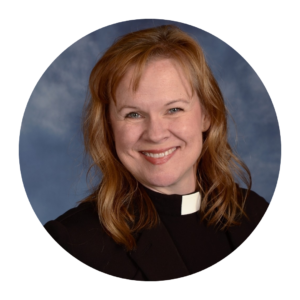We’ve all heard it by now: “I’m spiritual, but not religious.” I grew up hearing this. My mother, who essentially raised me as a single parent, had been wounded by the church of her youth. She was a deeply spiritual person, given some good teachings by her church, along with a host of bad ones. She experienced two near-death experiences in her early years, which created in her the conviction that the spiritual world was both real and the most real thing that exists. She passed on to me a love for the religious traditions of the world, but she kept religion at an arm’s length with the “I’m spiritual, but not religious” saying.

Stuck in the cycle of busy hoping that one day there will be time for your and what you want?
You are not alone. PEACEFUL LIVING COACHING is here to support you!
I was always fascinated by religion. As a teen, I was finally allowed to explore religion in its great varieties. I have walked a long and twisting road since then, unlearning a lot and learning a lot. I spent years teaching religious studies at a private high school, then teaching comparative religions at a college, and for the last decade working as clergy. I have learned a couple of things along the way about what people mean when they say what my mother said, and what I think about that saying.
My mother, and others like her, are wounded.
Unfortunately, religion is a huge power, that can be used for great good, great harm, or anything in between. There is not much about religion that is weak and anemic. It either gives life or it takes it away.
As a professor of religious studies and even more as a pastor, I have encountered dozens of youth and adults who have been harmed by religions. I feel incredible sympathy for this reality and I work hard to help reclaim religion for good, while recognizing and releasing its toxicity.
I have discovered that when people claim to be “spiritual but not religious,” most of the time they have either been wounded, or recognize the wounds of others.
There are of course those who have philosophical differences with organized religion, or those who have not been raised in religious systems, but generally those people do not say the “I am spiritual” part of the saying.
What makes religion specifically religion is two things. First, religion is an organized community of people. My mother and those like her come to not trust those kinds of people. My mom had friends, colleagues, and even spiritual groups and classes. But something about calling any group a “religious” group felt threatening to her.
The other component of religion is its telling stories, what religious studies calls “myths.” (In religious studies, a myth means a sacred story, not a lie). This storytelling is expressed in words and in actions, which religions call “ritual”. The community shares in storytelling through myth and ritual and that is what binds them together as religious community. They do not do all things together, they do not believe identical things, but they meet regularly and they have enough in common with their shared stories that they form a cohesive philosophical and practical group.
People do this in other ways, too. People are social animals, and so we seek and forms family units, clubs, work spaces, online chat rooms, bars, philanthropic organizations, schools, law firms, hospitals, universities, etc. Most of us do not live completely isolated all the time. The pandemic reminded us how much all of us need one another. No one is an island.
But if someone is hurt within an institution, they tend to perceive the entire spectrum of that institution as threatening. For instance, I might say, “I believe in love; I don’t believe in families.” You might deduce that I was perhaps hurt by my family and don’t believe I can find love in a family. Or I might say, “I believe in education; I don’t believe in schools.” Maybe you would deduce that I thought schools did more harm than good. Or if I said, “I want justice and governance; I want no part of politics.” You might think I was burned by politics or at the very least found politics to be ineffective to get to the goal of justice and governance.
Religions are characteristically communal and engaged in storytelling, but it is for an intrinsic purpose. This purpose is to help people discover and nurture their own spirituality. That is their point. Their method is with people and stories; their goal is spiritual development. If you keep the community and storytelling, but do not ever reach the goal of spiritual health, the religion is pointless and even harmful. In the wide varieties of religions of the world, many achieve this goal of spiritual nurturing; many sadly do not. There are as many versions as there are types of families – from the healthy to the sick, the loving to the abusive.
If I said, “I believe in love, not families,” you might say, “You are perhaps referring to families-done-badly.”
If I think that love cannot exist inside families, maybe it is because I have only known toxic families, not healthy ones. But families don’t have to be toxic. It is indeed possible, and in fact it should be the norm, to find love within families. Similarly, it should be expected that we find education within schools. It should be expected that we find paths to justice through governance within our political paths. Similarly, one should expect to find paths of understanding, practice, and support for spirituality within religion. Of course, love, education, justice, and spirituality exist beyond the bounds of these social institutions, but we should demand that our institutions deliver what they promise!
If you want to be “spiritual but not religious” I am not going to attempt to stop you. Similarly, feel free to find love outside of families, education outside of schools, and justice outside of politics. But what I do call for is making our systems the healthiest, least toxic, and most helpful they can be.
We as a people should never settle for religion-done-badly, families-done-badly, schools-done-badly, or politics-done-badly. None of us is perfect, but we can keep the bar high, away from toxicity and abuses of power and toward the highest and best ideals we can have.
In my social institution of Christianity, that means the ideals that matter are the words and actions of Jesus himself. He was all about great love, acceptance, peace, mercy, and compassion. He told those whose egos grew big with power plays to knock off the arrogance. He never would have condoned an institution telling stories in his name traumatizing my young mother and countless others.
This is obvious to me. Jesus himself was against religion-done-badly and advocated religion-done-well. This means gathering, telling stories, and loving God and each other, especially those who haven’t felt loved by their systems. Religion should always support spiritual health and well-being.
If you have been hurt by any representative of organized religion, I am so sorry. You encountered bad religion. Just as if you were in an abusive family, I would counsel you to leave abuse and go find safety, love, and peace. There is so much better for you than toxicity – from any form. You are a child of God and deserve people who support you. May we all find — and then become — powerfully loving examples of spiritual, and even religious, health.

STEPHANIE LAPE
Stephanie Lape is a pastor in the Evangelical Lutheran Church in America (ELCA).
She holds a Master of Arts degree in Transpersonal Psychology (the psychology of religious experience) from the Institute of Transpersonal Psychology, and a Master of Divinity degree from Luther Seminary. A long-time professor of comparative religions and former campus minister, she now serves as pastor at Eden Lutheran Church in Riverside, California.
Stephanie speaks and teaches on matters of spiritual and psychological development, biblical studies, the enneagram personality tool, and comparative religions. She is an active advocate for interfaith and ecumenical studies. She has taught classes on major religious movements in churches, schools, and city programs, while also leading tours and guest speaking at mosques, synagogues, and temples. Stephanie is honored to be a speaker at the 2021 and 2023 Parliament of the World’s Religions.
She also loves to write. Stephanie is a contributing author for Living Lutheran Magazine and author of Beckoned: Hearing God’s Call to Deeper Faith, which is both a travelogue of her own winding spiritual journey, as well as a guide to help people discover their own path. She lives with her husband and two children in Southern California.



